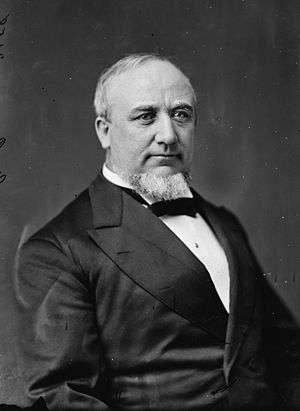Cavendish W. Cannon
Cavendish Wells Cannon (February 1, 1895 – October 7, 1962) was a long-time United States foreign service officer and diplomat.[1]
During World War II Cavendish served as the Assistant Chief of the State Department's Division of Southern European Affairs.[2] For a time Cannon's work took him to Syria.[3]
He served as U.S. ambassador to Greece from 1953 to 1956 and ambassador to Morocco from 1956 to 1958. During the late 1940s Cannon served as ambassador to Yugoslavia[4] Among his fellow ambassadors was the Czechoslovak Ambassador Josef Korbel. Cannon was one of the people who spoke in favor of Korbel's pro-democratic leanings when he was trying to gain assylum in the United States.[5]
In 1948 Cannon was the chair of the US delegation to the Danube River Conference of 1948.
Cannon was a member of The Church of Jesus Christ of Latter-day Saints.[6]
| Diplomatic posts | ||
|---|---|---|
| Preceded by James Hugh Keeley, Jr. |
U.S. Envoy Extraordinary and Minister Plenipotentiary to Syria 1950–1952 |
Succeeded by James S. Moose, Jr. |
| Preceded by Lincoln MacVeagh |
United States Ambassador to Portugal 1952–1953 |
Succeeded by M. Robert Guggenheim |
| Preceded by John Emil Peurifoy |
United States Ambassador to Greece 1953–1956 |
Succeeded by George V. Allen |
| Preceded by William J. Porter |
United States Ambassador to Morocco 1956–1958 |
Succeeded by Charles W. Yost |
References
- ↑ "Cavendish Wells Cannon". U. S. Department of State. Retrieved May 28, 2011.
- ↑ the Problem of Bessarabia and Northern Bucovina during World War II
- ↑ excerpt from journal of Eleanor Roosevelt
- ↑ Jones, Howard. "A New Kind of War", America's Global Strategy and the Truman Doctrine. (New York: Oxford University Press, 1989) p. 126
- ↑ Dobbs, Michael (March 15, 2000). Madeleine Albright: A Twentieth-Century Odyssey. Henry Holt and Company. pp. 130, 137. ISBN 978-0-8050-5660-0. Retrieved August 4, 2013.
- ↑ “Church Member Nominated Ambassador to Finland,” Ensign, March 1975 p. 78.
